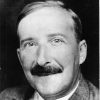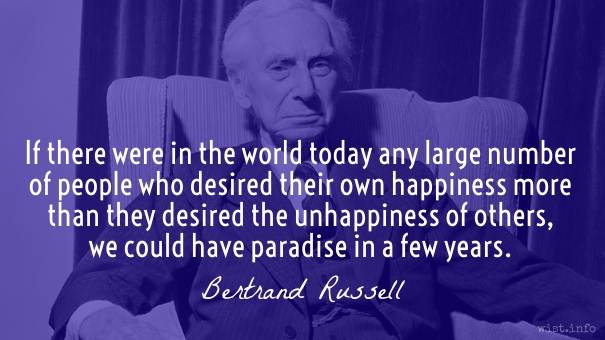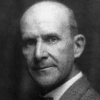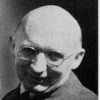Let no one who loves be called altogether unhappy. Even love unreturned has its rainbow.
J. M. Barrie (1860-1937) Scottish novelist and dramatist [James Matthew Barrie]
The Little Minister, ch. 24 “The New World, and the Woman Who May Not Dwell Therein” (1891)
(Source)
Quotations about:
unhappiness
Note not all quotations have been tagged, so Search may find additional quotes on this topic.
BENEDICK: Well, everyone can master a grief but he that has it.
William Shakespeare (1564-1616) English dramatist and poet
Much Ado About Nothing, Act 3, sc. 2, l. 27ff (3.2.27-28) (1598)
(Source)
History is the only consolation left to the peoples, for it teaches them that their ancestors were as unhappy as themselves, or more unhappy.
[En effet, il ne reste guère, pour consoler les peuples, que de leur apprendre que leurs ancêtres ont été aussi malheureux, ou plus malheureux.]Nicolas Chamfort (1741-1794) French writer, epigrammist (b. Nicolas-Sébastien Roch)
Products of Perfected Civilization [Produits de la Civilisation Perfectionée], Part 1 “Maxims and Thoughts [Maximes et Pensées],” ch. 8, ¶ 474 (1795) [tr. Mathers (1926)]
(Source)
(Source (French)). Alternate translations:In fact there is no longer any way of consoling the people except by teaching them that their forebears were as wretched as they are, or more so.
[tr. Merwin (1969)]Indeed, if one is to console the peoples of the world there is little else one can do but teach them that their ancestors were just as wretched, or more so.
[tr. Pearson (1973)]In effect, there is nearly no way to console peoples except to tell them that their ancestors were as unfortunate or more unfortunate than they are.
[tr. Siniscalchi (1994), ¶ 473]
I don’t know ov a better kure for sorrow than tew pity sum boddy else.
[I don’t know of a better cure for sorrow than to pity somebody else.]
He called to mind all the millionaires he had ever read or heard of; they didn’t seem to get much fun out of their riches. The majority of them were martyrs to dyspepsia. They were often weighed down by the cares and responsibilities of their position; the only people who were unable to obtain an audience of them at any time were their friends; they lived in a glare of publicity, and every post brought them hundreds of begging letters, and a few threats; their children were in constant danger from kidnappers, and they themselves, after knowing no rest in life, could not be certain that even their tombs would be undisturbed. Whether they were extravagant or thrifty, they were equally maligned, and, whatever the fortune they left behind them, they could be absolutely certain that, in a couple of generations, it would be entirely dissipated.
F. Anstey (1856-1934) English novelist and journalist (pseud. of Thomas Anstey Guthrie)
The Brass Bottle, ch. 7 (1900)
(Source)
About one-half the discumfert ov this life iz the result ov gitting tired ov ourselfs.
[About one-half the discomfort of this life is the result of getting tired of ourselves.]
Josh Billings (1818-1885) American humorist, aphorist [pseud. of Henry Wheeler Shaw]
Everybody’s Friend, Or; Josh Billing’s Encyclopedia and Proverbial Philosophy of Wit and Humor, ch. 132 “Affurisms: Chips” (1874)
(Source)
Are you happy now? Are you likely to remain so till this evening? or next week? or next month? or next year? Then why destroy present happiness by a distant misery, which may never come at all, or you may never live to see it? for ever substantial grief has twenty shadows, and most of them shadows of your own making.
Sydney Smith (1771-1845) English clergyman, essayist, wit
Memoir of the Reverend Sydney Smith, by His Daughter, Lady Holland, Vol. 1, ch. 11 (1855)
(Source)
Advice for fighting melancholy / depression / anxiety by "taking short views of life" and not borrowing trouble.
I think that if there go on being great wars and great oppressions and many people leading very unhappy lives, probably religion will go on, because I’ve observed that the belief in the goodness of God is inversely proportional to the evidence. When there’s no evidence for it at all, people believe it, and, when things are going well and you might believe it, they don’t.
Bertrand Russell (1872-1970) English mathematician and philosopher
Interview by Woodrow Wyatt, BBC TV (1959)
(Source)
Collected in Bertrand Russell's BBC Interviews (1959) [UK] and Bertrand Russell Speaks His Mind (1960) [US]. Reprinted (abridged) in The Humanist (1982-11/12), and in Russell Society News, #37 (1983-02).
There will always be a lost dog somewhere that will prevent me being happy.
[Il y aura toujours un chien perdu quelque part qui m’empêchera d’être heureux.]
They gave themselves up wholly to their sorrow, seeking increase of wretchedness in every reflection that could afford it, and resolved against ever admitting consolation in future.
One of the saddest things is that the only thing that a man can do for eight hours a day, day after day, is work. You can’t eat eight hours a day nor drink for eight hours a day nor make love for eight hours — all you can do for eight hours is work. Which is the reason why man makes himself and everybody else so miserable and unhappy.
William Faulkner (1897-1962) American novelist
“The Art of Fiction,” Interview by Jean Stein, Paris Review #12 (Spring 1956)
(Source)
You don’t seem to realize that a poor person who is unhappy is in a better position than a rich person who is unhappy. Because the poor person has hope. He thinks money would help. I tell you there is no despair like the despair of the man who has everything.
Jean Kerr (1922-2003) American author and playwright [b. Bridget Jean Collins]
Poor Richard, Act 1 [Sydney] (1963)
(Source)
There is nothing like employment, active indispensable employment, for relieving sorrow. Employment, even melancholy, may dispel melancholy, and her occupations were hopeful.
For what is there more hideous than avarice, more brutal than lust, more contemptible than cowardice, more base than stupidity and folly? Well, then, are we to call those persons unhappy, who are conspicuous for one or more of these, on account of some injuries, or disgraces, or sufferings to which they are exposed, or on account of the moral baseness of their sins?
[Quid enim foedius auaritia, quid immanius libidine, quid contemptius timiditate, quid abiectius tarditate et stultitia dici potest? Quid ergo? Eos qui singulis uitiis excellunt aut etiam pluribus, propter damna aut detrimenta aut cruciatus aliquos miseros esse dicimus, an propter uim turpitudinemque uitiorum?]
Marcus Tullius Cicero (106-43 BC) Roman orator, statesman, philosopher
De Legibus [On the Laws], Book 1, ch. 19 / sec. 51 (1.19/1.51) [Marcus] (c. 51 BC) [tr. Barham/Yonge (1878)]
(Source)
(Source (Latin)). Alternate translations:For what is there more hideous than avarice, more ferocious than lust, more contemptible than cowardice, more base than stupidity and folly? Well, therefore, may we style unhappy, those persons in whom any one of these vices is conspicuous, not on account of the disgraces or losses to which they are exposed, but on account of the moral baseness of their sins.
[tr. Barham (1842)]For what can be thought of that is more loathsome than greed, what more inhuman than lust, what more contemptible than cowardice, what more degraded than stupidity and folly? Well, then, shall we say that those who are sunk deepest in a single vice, or in several, are wretched on account of any penalties or losses or tortures which they incur, or on account of the base nature of the vices themselves?
[tr. Keyes (1928)]What can be called more revolting than greed, more bestial than lust, more despicable than cowardice, more abject than dullness and stupidity? What then? Take those people who are conspicuous for one (or more than one) vice. Do we call them wretched because of the losses or damages or pain they suffer, or because of the power and ugliness of their vices?
[tr. Rudd (1998)]What is uglier than greed, what is more horrible than lust, what is more contemptible than cowardice, what is lower than sloth and stupidity? What then? People who are remarkable for single vices or even for several -- do we call them wretched because of material losses or torture, or because of the great dishonor from the vices themselves?
[tr. Zetzel (1999)]What could be called fouler than avarice, what more monstrous than lust, what more scorned than cowardice, what more despicable than dullness and foolishness? What then? Do we say about those who are conspicuous for their individual vices, or even many vices, that they are wretched because of losses or damages or tortures, or because of the significance and the disgrace of their vices?
[tr. Fott (2013)]
Hope is the feeling we have that the feeling we have is not permanent.
Mignon McLaughlin (1913-1983) American journalist and author
The Neurotic’s Notebook, ch. 5 (1963)
(Source)
This phrase is often cited to Jean Kerr. That's because she paraphrases it in her play, Finishing Touches, Act 3 (1974):FELICIA: Do you know the book The Neurotic's Notebook? There's a line in it I say to myself when I get discouraged. It goes: "Hope is the feeling you have that the feeling you have isn't permanent."
Many of us go through life feeling as an actor might feel who does not like his part, and does not believe in the play.
Mignon McLaughlin (1913-1983) American journalist and author
The Neurotic’s Notebook, ch. 5 (1963)
(Source)
There is one illusion that has much to do with most of our happiness, and still more to do with most of our unhappiness. It may be told in a word. We expect too much.
Joseph Farrell (1841-1885) Irish Jesuit priest, lecturer, preacher
“About Happiness,” The Lectures of a Certain Professor (1877)
(Source)
Imprisoned in every fat man a thin one is wildly signalling to be let out.
Cyril Connolly (1903-1974) English intellectual, literary critic and writer.
The Unquiet Grave, Part 2 “Te Palinure Petens” (1944)
(Source)
Many of our disappointments and much of our unhappiness arise from our forming false notions of things and persons. We strangely impose upon ourselves; we create a fairyland of happiness. Fancy is fruitful and promises fair, but, like the dog in the fable, we catch at a shadow, and when we find the disappointment, we are vexed, not with ourselves, who are really the imposters, but with the poor, innocent thing or person of whom we have formed such strange ideas.
Abigail Adams (1744-1818) American correspondent, First Lady (1797-1801)
Letter to Hannah Lincoln (5 Oct 1761)
(Source)
Wretchedness is caused by emotional disturbances, and the happy life by calmness, and disturbance takes two forms — anxiety and fear in expecting evils, ecstatic joy and lustful thoughts in misunderstanding good things, all of which are at variance with with wisdom and reason. Accordingly, if a man possesses self-control and consistency, and is without fear, distress, excitability, or lust, is he not happy? But this is the nature of the wise man always, so he is happy always.
[Atque cum perturbationes animi miseriam, sedationes autem vitam efficiant beatam, duplexque ratio perturbationis sit, quod aegritudo et metus in malis opinatis, in bonorum autem errore laetitia gestiens libidoque versetur, quae omnia cum consilio et ratione pugnent, his tu tam gravibus concitationibus tamque ipsis inter se dissentientibus atque distractis quem vacuum solutum liberum videris, hunc dubitabis beatum dicere? atqui sapiens semper ita adfectus est; semper igitur sapiens beatus est.]
Marcus Tullius Cicero (106-43 BC) Roman orator, statesman, philosopher
Tusculan Disputations [Tusculanae Disputationes], Book 5, ch. 15 (5.15) / sec. 43 (45 BC) [tr. Davie (2017)]
(Source)
(Source (Latin)). Alternate translations:Now since the Disturbances of the Soul render the Life miserable, but the composure of them happy; and there is a double rank of Passions; in that, Discontent and Fear are terminated on Evils conceiv'd; but excessive Mirth and Lust arise from the misapprehension of good things, since all are inconsistent with Advice and Reason, if you shall see any one clear, emancipated, free from these emotions so vehement, so discordant one with the other, and so distracting, can you make any question of calling him Happy? But the Wise man is always so dispos'd, therefore the Wise man is always Happy.
[tr. Wase (1643)]But as the perturbations of the mind make life miserable, and tranquility renders it happy: and as these perturbations are of two sorts; grief and fear, proceeding from imagined evils, immoderate joy and lust, from the mistake of what is good; and all these are in opposition to reason and counsel; when you see a man at ease, quite free and disengaged from such troublesome commotions, which are so much at variance with one another, can you hesitate to pronounce such a one a happy man? Now the wise man is always in such a disposition: therefore the wise man is always happy.
[tr. Main (1824)]But when the perturbations render life unhappy, while their repose makes it happy -- and since the mode of perturbation is twofold -- sorrow and fear having birth from reputed evils -- the delirium of joy and desire, from the delusion of good, -- when all these are repugnant to counsel and reason, and you see a man void, exempt, free from these excitements, so vehement, so discordant, so distracted by mutual conflicts, -- will you hesitate to pronounce him happy? But the wise man is always thus, and therefore always happy.
[tr. Otis (1839)]But as the perturbations of the mind make life miserable, and tranquillity renders it happy; and as these perturbations are of two sorts, grief and fear, proceeding from imagined evils, and as immoderate joy and lust arise from a mistake about what is good, and as all these feelings are in opposition to reason and counsel; when you see a man at ease, quite free and disengaged from such troublesome commotions, which are so much at variance with one another can you hesitate to pronounce such an one a happy man? Now the wise man is always in such a disposition, therefore the wise man is always happy.
[tr. Yonge (1853)]Now since perturbations of mind create misery, while quietness of mind makes life happy, and since there are two kinds of perturbations, grief and fear having their scope in imagined evils, inordinate joy and desire in mistaken notions of the good, all being repugnant to wise counsel and reason, will you hesitate to call him happy whom you see relieved, released, free from these excitements so oppressive, and so at variance and divided among themselves? Indeed one thus disposed is always happy. Therefore the wise man is always happy.
[tr. Peabody (1886)]
Unhappiness makes people vulnerable, incessant suffering unjust. Just as in the relations between a creditor and a debtor there is always an element of the disagreeable that can never be overcome, for the very reason that the one is irrevocably committed to the role of giver and the other to that of receiver, so in a sick person a latent feeling of resentment at every obvious sign of consideration is always ready to burst forth.
This communicating of a man’s self to his friend worketh two contrary effects; for it redoubleth joys and cutteth griefs in Halves. For there is no man that imparteth his joys to his friend, but he joyeth the more; and no man that imparteth his griefs to his friend, but that he grieveth the less.
Francis Bacon (1561-1626) English philosopher, scientist, author, statesman
“Of Friendship,” Essays, No. 27 (1625)
(Source)
The happy should not insist too much upon their happiness in the presence of the unhappy.
If you are a person who looks at the funny side of things, then sometimes when you are lowest, when everything seems totally hopeless, you will come up with some of your best ideas. Happiness does not create humor. There’s nothing funny about being happy. Sadness creates humor.
Charles Schulz (1922-2000) American cartoonist
“On Staying Power,” My Life with Charlie Brown (2010) [ed. Inge]
(Source)
Oftentimes, when people are miserable, they will want to make other people miserable, too. But it never helps.
Lemony Snicket (b. 1970) American author, screenwriter, musician (pseud. for Daniel Handler)
The Wide Window (2000)
(Source)
There is no happiness in life, there is no misery, like that growing out of the dispositions which consecrate or desecrate a home.
TRINCULO: Misery acquaints a man with strange bedfellows.
William Shakespeare (1564-1616) English dramatist and poet
Tempest, Act 3, sc. 2, l. 40 (3.2.40) (1611)
(Source)
If life becomes hard to bear we think of a change in our circumstances. But the most important and effective change, a change in our own attitude, hardly even occurs to us, and the resolution to take such a step is very difficult for us.
Ludwig Wittgenstein (1889-1951) Austrian-English philosopher
Culture and Value, 1946 (1977) [tr. Winch (1980)]
(Source)
There’s enough sorrow in the world, isn’t there, without trying to invent it.
E. M. Forster (1879-1970) English novelist, essayist, critic, librettist [Edward Morgan Forster]
A Room with a View, ch 2 (1908)
(Source)
He who has so little knowledge of human nature, as to seek happiness by changing any thing but his own dispositions, will waste his life in fruitless efforts, and multiply the griefs which he purposes to remove.
Samuel Johnson (1709-1784) English writer, lexicographer, critic
The Rambler, #6 (7 Apr 1750)
(Source)
This planet has — or rather had — a problem, which was this: most of the people living on it were unhappy for pretty much all of the time. Many solutions were suggested for this problem, but most of these were largely concerned with the movement of small green pieces of paper, which was odd because on the whole it wasn’t the small green pieces of paper that were unhappy.
Douglas Adams (1952-2001) English writer
The Hitchhiker’s Guide to the Galaxy, Introduction (1979)
(Source)
I live my life in celebration and in praise of the life I’m living. What you focus on expands. The more you praise and celebrate your life, the more there is in life to celebrate. The more you complain, the more you find fault, the more misery and fault you will have to find.
Oprah Winfrey (b. 1954) American TV personality, actress
“Words of the Week,” Jet (27 Oct 1986)
(Source)
Since unhappiness excites interest, many, in order to render themselves interesting, feign unhappiness.
Joseph Roux (1834-1886) French Catholic priest
Meditations of a Parish Priest: Thoughts, ch. 5, #24 (1886)
(Source)
The most general survey shows us that the two foes of human happiness are pain and boredom.
[Der allgemeinste Überblick zeigt uns, als die beiden Feinde des menschlichen Glückes, den Schmerz und die Langeweile.]
Arthur Schopenhauer (1788-1860) German philosopher
Parerga and Paralipomena, Vol. 1, “Aphorisms on the Wisdom of Life [Aphorismen zur Lebensweisheit],” ch. 2 “Of What One Is” [Von dem, was einer ist]” (1851) [tr. Saunders (1890)]
(Source)
(Source (German)). Alternate translation:The most general survey shows that pain and boredom are the two foes of human happiness.
[tr. Payne (1974)]
If there were in the world today any large number of people who desired their own happiness more than they desired the unhappiness of others, we could have paradise in a few years.
Bertrand Russell (1872-1970) English mathematician and philosopher
Interview by Seth King, New York Times (1961-05-18)
Interview on his 89th Birthday. The article does not presently show up in the NYT archives, but the quotation is mentioned in Newsweek, "Newsmakers" (1961-05-29), and in Think Magazine, "Thoughts" (1961-12).
The misery of man proceeds not from any single crush of overwhelming evil, but from small vexations continually repeated.
Samuel Johnson (1709-1784) English writer, lexicographer, critic
Lives of the English Poets, “Pope” (1781)
(Source)
CLAUDIUS: When sorrows come, they come not single spies,
But in battalions.William Shakespeare (1564-1616) English dramatist and poet
Hamlet, Act 4, sc. 5, l. 84ff (4.5.84-85) (c. 1600)
(Source)
Depend upon it if a man talks of his misfortunes there is something in them that is not disagreeable to him; for where there is nothing but pure misery there never is any recourse to the mention of it.
Samuel Johnson (1709-1784) English writer, lexicographer, critic
Comment (1780)
(Source)
In Boswell, The Life of Samuel Johnson, ch. 51 "1780" (1791)
Misery is almost always the result of thinking.
Joseph Joubert (1754-1824) French moralist, philosopher, essayist, poet
Pensées [Thoughts], ch. 5 “Des Passions et des Affections de l’Âme [On the Soul],” (1850 ed.) [tr. Collins (1928)]
(Source)
I could not find an analog in other translations of the Pensées, or in the published French.
It is not sufficiently considered how much he assumes who dares to claim the privilege of complaining; for as every man has, in his own opinion, a full share of the miseries of life, he is inclined to consider all clamorous uneasiness as a proof of impatience rather than of affliction, and to ask, what merit has this man to show, by which he has acquired a right to repine at the distributions of nature? Or, why does he imagine that exemptions should be granted him from the general condition of man? We find ourselves excited rather to captiousness than pity, and, instead of being in haste to sooth his complaints by sympathy and tenderness, we inquire whether the pain be proportionate to the lamentation; and whether, supposing the affliction real, it is not the effect of vice and folly, rather than calamity?
Samuel Johnson (1709-1784) English writer, lexicographer, critic
The Rambler, #50 (8 Sep 1750)
(Source)
Comparison, more than Reality, makes Men happy or wretched.
Thomas Fuller (1654-1734) English physician, preacher, aphorist, writer
Gnomologia: Adages and Proverbs, #1133 (1732)
(Source)
To believe that if we could have but this or that we would be happy is to suppress the realization that the cause of our unhappiness is in our inadequate and blemished selves. Excessive desire is thus a means of suppressing our sense of worthlessness.
Eric Hoffer (1902-1983) American writer, philosopher, longshoreman
The Passionate State of Mind, Aphorism 6 (1955)
(Source)
We are never quite as happy, or as unhappy, as we think.
[On n’est jamais si heureux ni si malheureux qu’on s’imagine.]
François VI, duc de La Rochefoucauld (1613-1680) French epigrammatist, memoirist, noble
Réflexions ou sentences et maximes morales [Reflections; or Sentences and Moral Maxims], ¶49 (1665-1678) [tr. FitzGibbon (1957)]
(Source)
Present in the first edition. In the first four editions, the concluding words were "... que l’on pense [whatever one thinks]." In the manuscript, this maxim read:One is never so unhappy as one fears, nor so happy as one hopes.
[On n’est jamais si malheureux qu’on craint, ni si heureux qu’on espère.]
Another manuscript version is what the Davies translation below derives from:Les biens et les maux sont plus grands dans notre imagination qu’ils ne le sont en effet, et on n’est jamais si heureux ni si malheureux que l’on pense.
Above notes. (Source (French)). Alternate translations:Goods and Evils are much greater in our imaginations of them, than they are in effect; and men are never so happy or unhappy, as they think themselves.
[tr. Davies (1669), ¶128; see above.]None are either so happy or so unhappy, as they imagine.
[pub. Donaldson (1783), ¶211; ed. Lepoittevin-Lacroix (1797), ¶49]No person is either so happy;, or so unhappy, as he imagines.
[ed. Carville (1835), ¶184]We are never so happy, or so unhappy, as we imagine.
[ed. Gowens (1851), ¶50]We are never so happy or so unhappy as we suppose.
[tr. Bund/Friswell (1871); tr. Stevens (1939)]We are never as happy or unhappy as we think.
[tr. Heard (1917)]We are never so happy or so unhappy as we think.
[tr. Kronenberger (1959)]We are never as fortunate or as unfortunate as we suppose.
[tr. Tancock (1959)]We are never so happy nor so unhappy as we imagine.
[tr. Whichello (2016)]
ROSALIND:O,
how full of briers is this working-day world!William Shakespeare (1564-1616) English dramatist and poet
As You Like It, Act 1, sc. 3, l. 11ff (1.3.11-12) (1599)
(Source)
DUKE SENIOR: Thou seest we are not all alone unhappy.
This wide and universal theater
Presents more woeful pageants than the scene
Wherein we play in.William Shakespeare (1564-1616) English dramatist and poet
As You Like It, Act 2, sc. 7, l. 142ff (2.7.142-145) (1599)
(Source)
When I have occasionally set myself to consider the different distractions of men, the pains and perils to which they expose themselves at court or in war, whence arise so many quarrels, passions, bold and often bad ventures, etc., I have discovered that all the unhappiness of men arises from one single fact, that they cannot stay quietly in their own chamber.
Blaise Pascal (1623-1662) French scientist and philosopher
Pensées #139 “Diversion” (1670)
(Source)
Alt. trans.: "I have often said that man's unhappiness springs from one thing alone, his incapacity to stay quietly in one room."
Alt. trans.: "All the trouble in the world is due to the fact that a man cannot sit still in a room."
Every body and every thing conspire to make me as contented as possible in it; yet I have seen too much of the vanity of human affairs, to expect felicity from the splendid scenes of public life. I am still determined to be cheerful and to be happy, in whatever situation I may be; for I have also learnt, from experience, that the greater part of our happiness or misery depends upon our dispositions, and not upon our circumstances. We carry the seeds of the one or the other about with us, in our minds, wheresoever we go.
Martha Washington (1731-1802) American socialite, wife of George Washington, First Lady (1789-1797)
Letter to Mercy Otis Warren (1789-12-26)
(Source)
If it had not been for the discontent of a few fellows who have not been satisfied with their condition you would still be living in caves. You never would have emerged from the jungle. Intelligent discontent is the mainspring of civilization. Progress is born of agitation. It is agitation or stagnation.
Eugene V. Debs (1855-1926) American union leader, activist, socialist, politician
“The Issue,” Speech, Girard, Kansas (23 May 1908)
(Source)
CLAUDIO: The miserable have no other medicine
But only hope.William Shakespeare (1564-1616) English dramatist and poet
Measure for Measure, Act 3, sc. 1, l. 2ff (3.1.2-3) (1604)
(Source)
Happiness is not a reward — it is a consequence. Suffering is not a punishment — it is a result.
Robert Green Ingersoll (1833-1899) American lawyer, agnostic, orator
“The Christian Religion,” Part 2, The North American Review (Nov 1881)
(Source)
Unhappiness is not knowing what we want and killing ourselves to get it.
Don Herold (1889-1966) American humorist, cartoonist, author
(Attributed)
(Source)
Quoted in Lawrence Peter, Peter's People (1979) as "Herold's Law."
BOLINGBROKE: Grief makes one hour ten.
William Shakespeare (1564-1616) English dramatist and poet
Richard II, Act 1, sc. 2, l. 267 (1.2.267) (1595)
(Source)
If you are pained by external things, it is not they that disturb you, but your own judgment of them. And it is in your power to wipe out that judgment now.
Marcus Aurelius (AD 121-180) Roman emperor (161-180), Stoic philosopher
Meditations, Book 8, #47 [tr. Long (1862)]
(Source)
Modernized version (see below for original). Alternate translations:
- "If therefore it be a thing external that causes thy grief, know, that it is not that properly that doth cause it, but thine own conceit and opinion concerning the thing: which thou mayest rid thyself of, when thou wilt." [tr. Casaubon (1634), #45]
- "If externals put you into the spleen, take notice 'tis not the thing which disturbs you, but your notion about it: which notion you may dismiss if you please." [tr. Collier (1701)]
- "If thou art pained by any external thing, it is not this thing that disturbs thee, but thy own judgment about it. And it is in thy power to wipe out this judgment now." [tr. Long (1862), original]
- "If anything external vexes you, take notice that it is not the thing which disturbs you, but your notion about it, which notion you may dismiss at once if you please." [tr. Zimmern (1887)]
- "If you suffer pain because of some external cause, what troubles you is not the thing but your decision about it, and this it is in your power to wipe out at once." [tr. Farquharson (1944)]
- "If you are distressed by anything external, the pain is not due to the thing yourself but to your estaimte of it; and this you have the power to revoke at any moment." [tr. Staniforth (1964)]
Waste not fresh tears over old griefs.


















































